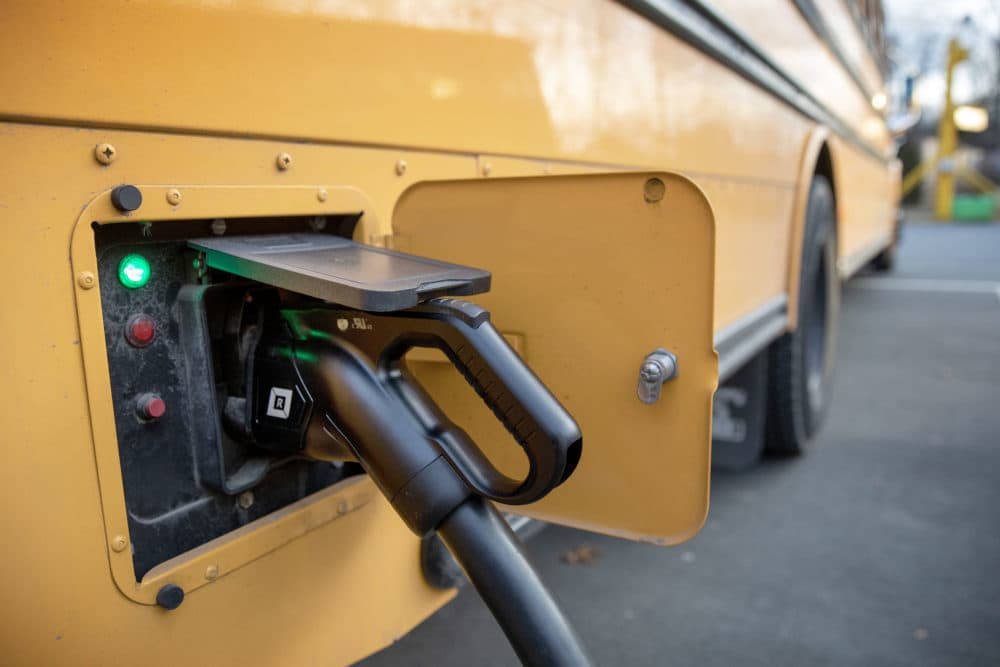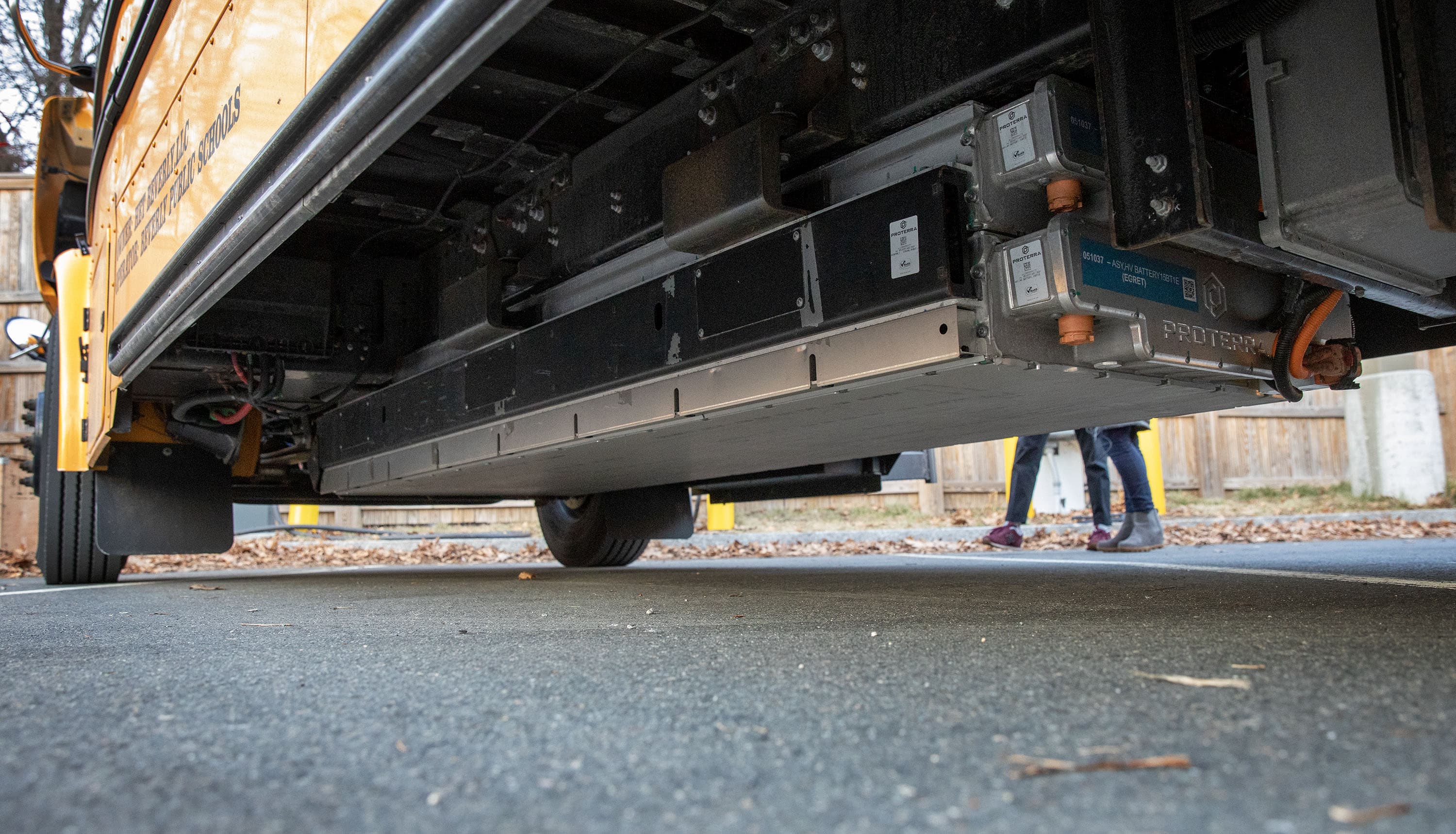Advertisement
More Massachusetts districts are switching to electric school buses

In a school bus lot in Beverly, bus driver Henry Birkemouse starts up an electric school bus.
A green light on the dashboard signals to the driver he can hit the accelerator. The bus resembles a traditional gas- or diesel-powered bus, yellow exterior and all, with the exception of the lettering on the hood that says "high voltage."
"It operates the same as any other bus," said Birkemouse. "It drives sort of like a golf cart."
Using about 60% less fossil fuels than gas-powered buses, electric buses are also a lot quieter and more energy-efficient than a traditional school bus, which emits exhaust fumes during idling. Diesel fumes, for example, can lead to eye irritation and nausea. And it can sometimes cause asthma and even lung cancer.
But with a price tag of roughly $350,000 — or two-and-a-half times that of a regular school bus — the electric model can be cost-prohibitive for school districts. It also presents logistical challenges due to the need to install charging stations and coordinate with local power companies.
Even so, a greater number of electric buses are appearing on Massachusetts' roads given new financing models, state and federal grants and legal pressure from environmental groups against diesel bus operators.
Currently only about 1% of the nation's 480,000 school buses are electric. And while they comprise just a small share of the pool, experts are optimistic electric school buses will multiply with the renewed attention and funding.

"The investment opportunity that's out there right now is really going to catalyze that action," said Laura Schifter, a senior fellow with The Aspen Institute's energy and environment program. "It will help our school districts build capacity with charging and help our workforce learn how to maintain and operate these buses."
If all of the nation's school buses ran on electricity, the impact on emissions would be immense. According to a 2018 report by the U.S. Public Interest Research Group, that would remove 5.3 million tons of greenhouse gases from the air.
Beverly Schools' electric-forward plan
Beverly Public Schools has two electric buses in its 48-vehicle fleet, and has plans to acquire three more this spring. The 4,600-student district was among the first in Massachusetts to start phasing in the cleaner, quieter vehicles several years ago.
Siblings Angelina and Kenneth Denis, who are in the second and fourth grades at Cove Elementary, say they love the quieter ride.
"It's awesome," said Angelina.
"It's so much quieter, even if some of the kids are a bit loud," chimed in her brother.
To their mother, Liane Ayres, it's the lack of diesel exhaust clogging the air that is the most welcome change.
"I was like, 'Oh! No fumes,'" she said.

Dana Cruikshank, the transportation director at Beverly Public Schools, said he can tell the difference right away.
"Having all diesel buses there, I’m walking in and around all of those running diesel buses. So I could really smell the fumes," he said. "There’s no fumes on this bus at all."
School officials in Beverly stumbled upon a promising way forward when they began partnering with Highland Electric Fleets, an electric transportation financing start-up, about three years ago. One of Highland's goals is to offer a simple, affordable way for school districts, municipalities and fleet managers to transition to electric vehicles.
The company sources private capital to buy the electric buses. They then lease them to school districts at the same cost districts pay for diesel vehicles. While this seems like a money-losing prospect, company leaders say it is actually profitable, because electric buses are about 30% to 50% cheaper to run and maintain over the course of their 15-year useful life span.
Advertisement
The company's director of market development, Amy McGuire, says it’s a good long term investment.
"The more we can get school buses on the road the more the market grows and the technology cost goes down," she said. "So hopefully it’s a self-fulfilling prophecy that we can electrify all of our school fleets."
In addition to Beverly, Highland Electric works with schools in about 30 other states and three Canadian Provinces, according to McGuire.
New sources of funding and legal pressure
Cleaner and more efficient school transportation has in recent years become a top priority for federal officials. Last year, the Environmental Protection Agency announced it would give out $5 billion in grants as part of a clean school bus initiative. Under the first round of funding last fall, five Massachusetts districts qualified, including Lawrence, New Bedford and Fall River. That’s going to put 76 new electric buses on Massachusetts' roads by next year.
Nationwide, state governments are investing more dollars into the effort. California, for example, committed $122 million in subsidies last year. Colorado offered $65 million. And a handful of other states have subsidy programs in the works.
In New England, environmental groups are using clean air regulations to exert legal pressure on large school bus operators to gradually phase in electric buses.
Conservation Law Foundation has sued large transportation vendors for violating bus idling regulations in New England. The organization has urged companies to install software to monitor how often buses idle and to agree to phase in electric buses.
In the last five years, the foundation successfully settled eight lawsuits against bus vendors, four of which serve schools.
"We really have to put the pressure on to get these companies to transition," said Heather Govern, vice president and director of CLF's Clean Air and Water Program.
